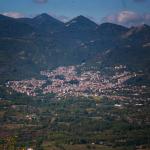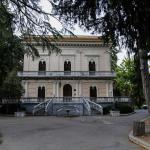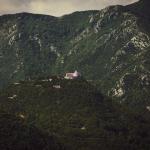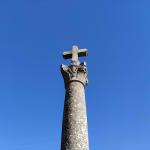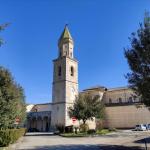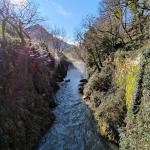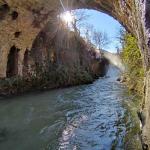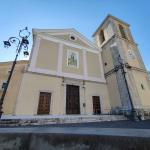The Municipality of Montella rises in the area of the Picentini Mountains Regional Park. It's a town with 7,629 inhabitants, located 634 metres above sea level, at 36 km from Avellino. The territory extends for 93.87 sq km and the adjoining municipalities are: Acerno, Bagnoli Irpino, Cassano Irpino, Giffoni Valle Piana, Montemarano, Nusco, Serino and Volturara Irpina. It's crossed by the river Calore.
The etymology of the name seems to derive from Monticulus or Montillus, from which Montilla, Motilla and finally Montella. It clearly derives from "monte" (mount) intended as "fortified hill". The inhabitants are called Montellesi and Saint Roch is their patron saint.
PLACES OF INTEREST
- The Convent of San Francesco a Folloni - Place rich in history, founded by Saint Francis of Assisi. In addition to the Church it's possible to visit the Chapel of the Crucifix, the Lovers Monument, the museum and the library
- Sanctuary of the Santissimo Salvatore (Holy Saviour) - Located at 954 meters of height, it has been the destination of pilgrimages for generations: popular traditions and stories merge with the cult, like drinking from the well of miracles or ringing the big bell
- Castello del Monte (Castle of the Mount) - Also called "Castello de Lo Monte", it's a fortress of the Roman and Lombard era, recently restored. The archaeological excavations carried out inside the walls have brought to light a necropolis with funerary furnishings
- Monastic Complex of Santa Maria della Neve (Saint Mary of the Snows) - Dating back to the 15th century, in a period of wars and plagues, it represents one of the most important testimonies from a religious, but also historical and ethnic point of view
- Villa Elena-De Marco - Splendid Art Nouveau style building, it was built between the end of the 19th century and the early 20th century on a project by the local architect Antonio Moscariello
- Museum of San Francesco a Folloni - The Convent of San Francesco houses a museum that depends from the Polo Museale della Campania, and that gravitates around the ancient refectory
- MUCAM Eco-Museo della Castagna di Montella (Museum of the Montella chestnut) - Multimedia museum dedicated to the typical product of Montella, its PGI chestnut
- Verteglia plateau - On the slopes of Mount Terminio, in an unspoiled natural environment, the splendid plateau stands out with picnic areas, restaurants, numerous nature trails, springs and splendid chestnut, beech and broad-leaved woods
- Naturalistic park - The territory of Montella is rich in mountain woods, streams, seasonal lakes, waterfalls, streams and hiking trails
- Other churches - Church of the Purgatory, Church of the Capone institute, Church of Maria SS. della Libera (Our Lady of Libera), Church of Maria SS. Addolorata (Church of Our Lady of Sorrow), Chiesa di Maria SS. del Carmelo (Church of Our Lady of Mount Carmel), Chiesa Matrice di S. Maria del Piano e S. Benedetto (Mother Church of Saint Mary of the Plains and Saint Benedict), Chiesa di S. Benedetto, Chiesa di S. Giovanni Battista (Church of Saint John the Baptist), Chiesa di S. Michele Arcangelo (Church of Saint Michael the Archangel), Chiesa di S. Nicola (Saint Nicholas), Chiesa di S. Pietro Apostolo (Church of Saint Peter the Apostle), Chiesa di S. Silvestro Papa (Church of Saint Pope Sylvester), Chiesa di S. Vito (Saint Vitus), Chiesa di S. Antonio Abate (Church of Saint Anthony the Abbot), Chiesa di S. Lucia (Saint Lucy)
- Historic palaces - Capone Palace, Bruni Palace, Abiosi Palace, Pascale Palace, Villa Trevisano, Gambone Palace, Coscia Palace, Casina Bruti
EVENTS
- Montella Chestnut PGI festival - Festival of national relevance which host different artists every year, with a food and wine route enhancing the Montella Chestnut PGI and the excellences of the territory
- Kaso Fest - Food and wine event linked to dairy products and to caciocavallo cheese made with Podolica milk
- Verteglia Mater - Event that takes place in summer, on the Verteglia plateau, with many food and wine events, enhancement of the territory and lots of music
- Francesco d'Incanto - Event that combines spirituality, art, music and culinary arts in the evocative setting of the Convent of San Francesco a Folloni
- Feast of the Holy Saviour - Religious cerimonies that have been celebrated since May of 1780, the day of the celebration of the Holy Trinity
TYPICAL FOOD AND PRODUCTS
- Montella Chestnut PGI - Product with white pulp seed, crunchy and with a pleasant sweet taste. It has a long shelf life, high quality flavour and fragrance and is considered among the best chestnuts produced in Italy
- Ricotta manteca di Montella PAT - With a cilindrical form and stray yellow colour, it has a soft, delicate and buttery texture: a very good food due its organoleptic characteristics
- Scamorza di Montella PAT - Cylindrical in shape, it's distinguished by the head that looks like a "baby": it has a sweet taste and a strong smell of milk and fresh butter
- Treccia di Montella PAT - Fresh stretched curd cheese, with a characteristic shape of three hand-woven cords and which can also be smoked
- Chestnut nougat PAT - Also called chestnut "pantorrone" o "spantorrone", it's a specialty that has been produced for over 30 years in areas renowned for the cultivation of chestnuts
- Caciocavallo podolico dei Monti Picentini PAT - Tasty and rare cheese aged up to 6 months, raw, hard and spun paste, particularly valuable
- Ricotta di pecora bagnolese PAT - Product of ancient tradition, coming from sheep of the breed called "bagnolese or malvizza", constantly grazing
- Caciocavallo Impiccato - Particular cooking technique of caciocavallo podolico, which has had a wide diffusion throughout the area. It's melted on hot coals and then spread on a slice of bread
- Caciocavallo Silano PDO - Semi-hard cheese, with spun curd, produced with milk from different breeds of cows, including Podolica
FUN FACTS
According to the legend, Saint Francis, once he arrived in Montella, asked the feudal lord for hospitality at the castle of the town, and the latter refused. Francesco, with his brothers, took refuge in the woods of Folloni and spent the night under a holm oak. That night it snowed heavily, except in the area of the tree under which the friars slept. The day after, the castellan realized what had happened and, having witnessed the miracle, he asked Saint Francis to leave the two friars in the area to build a convent.
The "holm oak of the miracle" was preserved as a relic under the altar of the Convent of San Francesco a Folloni for a long time.
HISTORICAL NOTES
The discovery of finds from the Bronze Age suggests that the Montella area was already inhabited in the third millennium BC What is certain, however, is that, around 500 BC some Samnite tribes from Irpinia settled in the area between the Calore and the Lacinolo rivers.
Montella was the town hall in Roman times and seat of an important gastaldate under the Lombard domination. It was administered by the Cavaniglia counts, who came to the Kingdom of Naples from Spain following Alfonso V of Aragon. In this period the area around the Castle began to depopulate, until the definitive abandonment of the fort at the beginning of the 16th century.
In the following centuries, different families took turns at the helm of Montella: the last lords, before the abolition of feudalism in 1806, were the Doria, Princes of Angri.
Montella is the emotion of hands that grip the ropes and mark the rhythm of a dance of devotion through the bell of the Holy Saviour, it's harmony among history, the sounds, the body and the spirit which reaches the inhabitants of the Calore Valley
Montella
Piazza degli Irpini, 83048 Montella AV, Italia
Did you like it? Leave a review
Your opinion is important! It will be visible after approval by the editorial staff.
To post a comment you must be an authenticated user. Log in with Social Login
